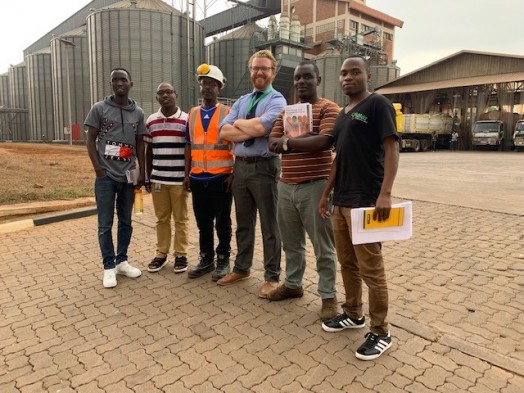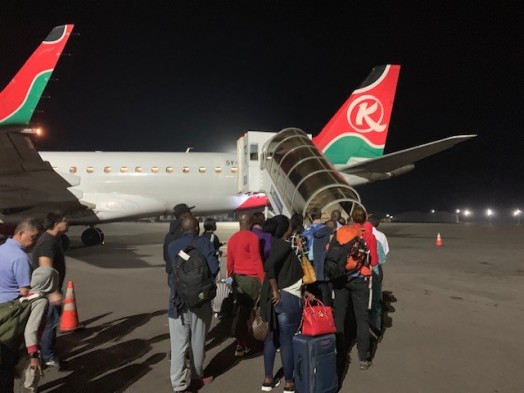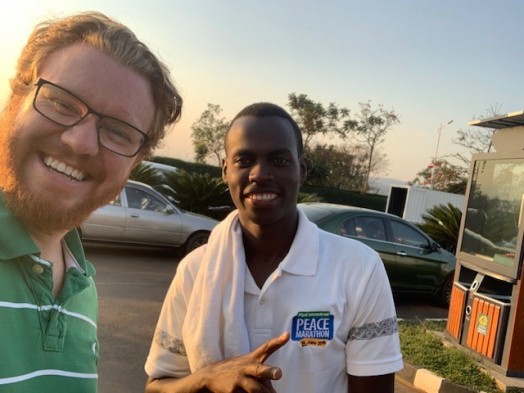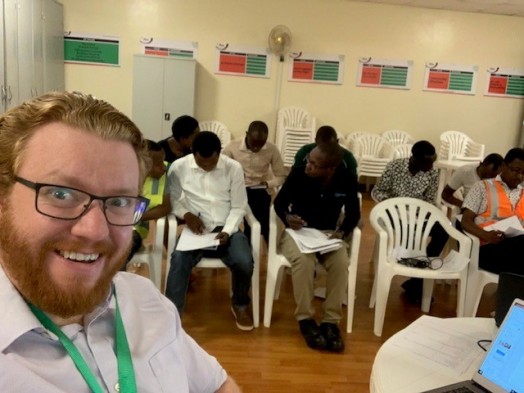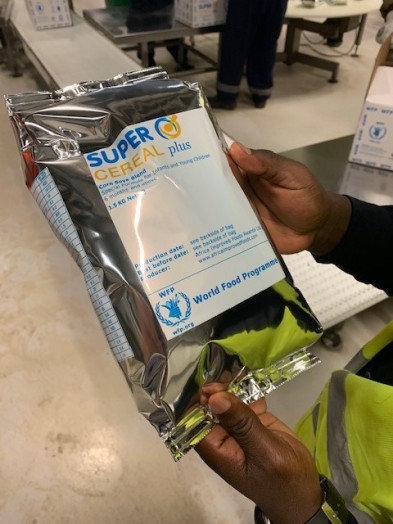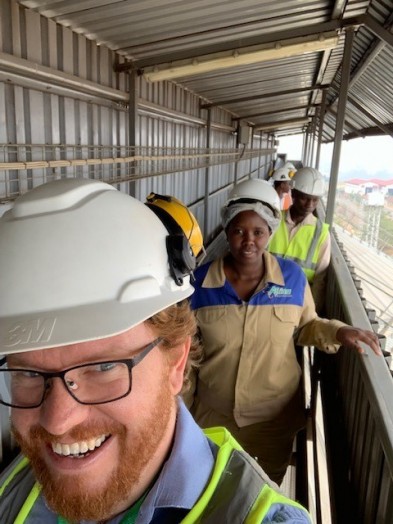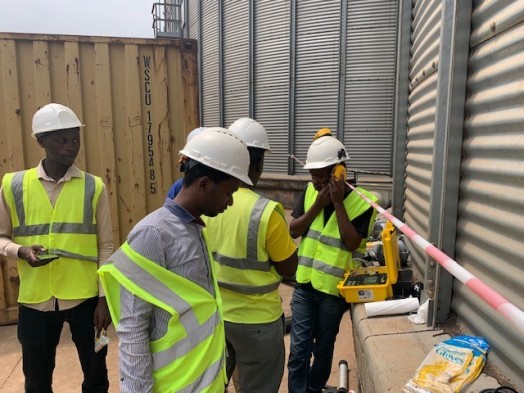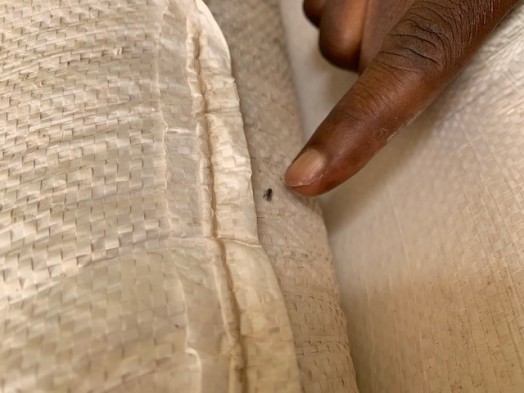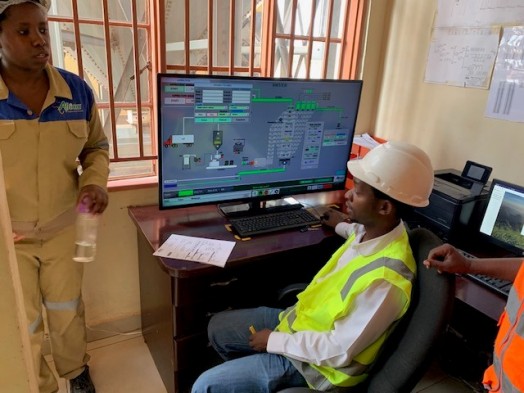Dealey Pest Academy- Fumigation Training in Rwanda
Wednesday 28th August 2019
Recently I have made a habit of saying yes to everything. Can we fumigate a ship in Aberdeen? Yes. Can we gas aeroplanes? Yes. Can we help save money on import management? Yes. Can we do void clearances… errr, yeeeesss?
Relentless positivity and full acceptance of opportunity have worked well so far. Everyone in the team pushes themselves to develop and learn new skills to make that ‘yes’ a reality. So, when the British Pest Control Association got in touch to ask if I could run a training course in Rwanda, of course, my answer was….
I had no idea exactly what to expect when I got to Kigali. The exchange of emails with the customer had been very abrupt in the lead up to the training project. East Africans are not well known for their communication, so I was not at all worried about the lack of information. Still, I did have to endure much joking from colleagues and family alike, espousing the benefits of hostage-taking, Ebola and bush meat.
Of course, it didn’t help my confidence that there was an Ebola outbreak two and a half hours’ drive from the training centre a week before my flight was due. But I had said yes already, I was committed, and I wanted to go to Africa and give my prospective students 100% value.
I had been told to expect someone from the customer company to greet me. When I got to arrivals at Kigali International Airport (after 24 hours of travel) a well-dressed man was waiting for me holding a sign with my name. I waved at him, and he looked blankly back. I waved again to the same reaction. This was not a good start, and I began to worry. Eventually, I manoeuvred through the crowd to be in front of him, pointed directly at his sign and then pointed to my chest and said “Me!”
He jumped, said “oh, sorry” and grabbed hold of me in a very sudden and very warm embrace. It turns out what I had mistaken for reticence was in fact him being tired, miles away and thinking about something else entirely.
The man was Julius Cesar, and he was to be my host and one of my students in Rwanda.
We drove about half an hour through the dark streets away from the airport. There were people everywhere, it was so lively and vibrant, and I had no idea what they were all up to, but it all looked meaningful and friendly. Initially, we took tarmac roads, then paved roads, then orange, dusty tracks, and I really felt like I was in Africa. My hotel “Icaza B&B” was a lit beacon of promise for a tired traveller, and I was very grateful to arrive at a clean house, surrounded by a ten-foot security fence (which I must admit, I found a bit unnerving) and lots of smiles and greetings.
After sleeping like the dead, I was due to meet the team at Africa Improved Foods, which would be my place of work for the next five days. Not sure what to expect I donned a suit and jumped in my taxi, in plenty of time to follow my instructions from my host- To be there “to meet the bosses at 0800 AM sharp!”
The driver took me through dusty streets, just as brimming with life as they had been the night before. People were walking everywhere, mostly very slowly, some with giant packs on their heads, some pushing ludicrously laden bicycles up hills, everyone looking busy. The terrain was very steep. The views were marvellous and infinitely foreign to the flat Suffolk landscape I had left behind. The soil very red, the birds and bugs marvellously colourful and strange. Everywhere I went in the taxi, heads would swivel, and people would stare unabashed at my peculiar white face with its even more peculiar orange beard. Mostly these exchanges of looks would result in me grinning, the observer grinning back and maybe a friendly wave. Occasionally they would result in me grinning and a returned look of complete confusion as if to say, “what are you?”
After what felt like a long drive, the driver stopped and pointed. “There!” he said. I looked. It was a dusty transport yard with some colourful hand-painted lorries and some jarringly familiar Caterpillar container handling equipment. “Are you sure?” I said. “Yes,” said the driver, commandingly, pointing again. I tucked away my British politeness for a second and checked my phone. We were several miles away from where I was expecting to be. I pointed at the map on my phone and said, “Kigali Economic Zone?” The driver grinned, said “sorry!” and drove off again without another word. Thank god for Google Maps.
Now I should probably mention that the style of driving in Rwanda is not great for the nerves. Essentially it is like anywhere else, with lane discipline, indicators and road signs. But what is a bit different is the way that drivers will drive at things, expecting for them to just get out of the way. If they don’t move, the driver beeps. If they still don’t move, the driver will never break, rather they will casually swerve around the person, bicycle, motorcycle, bus, lorry at exactly the same pace they were going. It worked extraordinarily well. Everyone seemed to have ‘signed up’ to this way of careering about at some Extraordinary General Meeting of insane drivers and they all anticipated each other’s manoeuvres marvellously. The only person worried was the hairy white boy being taxied about while gripping his thighs.
After another half hour of driving in this manner, we arrived at Kigali Economic Zone. We had a lovely chat, which I didn’t exactly follow, with a young man in a hat, holding an assault rifle, who I assumed to be the police of some sort. He asked me for my passport, and I had rather cleverly left it in my hotel. He did a lot of prolonged laughing with the driver, while I sat there and felt like a tit, and then we went about our day.
Kigali economic zone is an exceptionally modern industrial estate, built on the scale of a James Bond villain’s enterprise. It sits atop a giant hill like a modern castle of capitalism. Familiar names such as Yara Fertilisers and Volkswagen appeared out of the shimmering heat, flanked by unfamiliar infrastructure companies, set up to supply the rapidly increasing Rwandan GDP.
The sides of the industrial estate roads were peppered with uniformed workers with witch-brooms sweeping the dust out of the gutters and generally keeping the place looking every bit as modern and neat as it could be.
When we turned the corner around the big hill, I saw the ten 2000 tonne silos that were our destination. Africa Improved Foods. We approached the giant security gates and had another conversation about who the hell I was and about missing passports. Thankfully the exchange lacked any guns this time.
A small amount of research on the internet before my trip had shown me that this was a company with a great mission and giant ambition. They have set out to combat malnutrition in East Africa and with the investment from European food giants and the Rwandan government, they have created a remarkable enterprise. The output from their factories is largely vitamin-fortified maize and soya porridges that are delivered all over east Africa, the horn of Africa and the Middle East. In conjunction with the World Food Programme, they have been delivering packs of aid to refugees in Yemen and genuinely saving lives. I felt like an imposter amongst so much goodwill, but I quelled my soul and jumped out of the car, bidding the driver adieu and marching towards the office building.
Julius Cesar was there to greet me again (I later found out his name was Jules, but I preferred calling him Julius for fun). No hugs this time but a handshake and a business-like attitude. We were off to see the bosses. We walked through an immaculate tarmac yard and past safety signs that could have been transported directly from England, having been polished on the way. In the distance, I could see a shiny Cimbria dryer and a perfect arrangement of ‘wet-bin’ holdings that were very familiar. In short, after the dusty streets and confused stares of Kigali, the place was VERY impressive.
Julius showed me into the modern air-conditioned building and up the stairs, past the well-dressed receptionist and tropical plants in the lobby. In the first-floor office, I met boss after boss after boss and was greeted like a returning hero by them all. All of them had the attitude that I would be bringing hallowed advice from the Land of Health and Safety to help them improve their operations. Suffice to say, after my expectations; their attitude was VERY impressive.
After a half-hour of chatting, which felt like several small job interviews, I was guided to the training room. It was giant. I had been expecting a portacabin or a whitewashed stone classroom. What I found was a room big enough to hold 50 trainees with an overhead projector and corporate slogans lining the walls. Of course, there were African touches here and there such as the furniture being slightly wobbly white plastic patio furniture but after what I had seen of the site so far, who am I to judge?
The ten candidates were all ready and prepared. They greeted me slightly less warmly, and I got the feeling that they would rather be outside. Thankfully after a few years of speaking in front of rooms of pest controllers, this attitude was very familiar, and I felt myself relax!
We went through all the introductions, which I promptly forgot like the privileged English tosser I am, and we launched straight into things.
I nearly fell over when I began to unpack my branded notebooks I had brought in my luggage from the UK, and I looked up to see that each candidate was getting out his or her own notebooks and pens! I couldn’t believe it. After years of trying to convince pest controllers that they need to take more notes, I arrive in the middle of Africa to find that ‘getting everything you can out of courses’ is already a cultural norm.
The first part of the course passed without much drama. Pertinent questions were asked in perfect English. Pens scribbled frantically under studious frowns. Everyone appeared to be just ‘getting it.’
We had a break at 1100. Everyone filed out of the room, and one young student remained behind to speak to me. He introduced himself as Justin, and we had a chat about this and that. After five or so minutes, I commented: “your knowledge is already very good!” He said, “thank you,” and casually mentioned, “oh, I have a master’s degree in food safety from Ghent University.” I was aghast. What was a farm boy from East Anglia doing here to train people more qualified than he is?
Luckily it transpired that Justin and Julius were the most experienced in the room and I was soon calmed a bit by the amount of specialist insect knowledge I was able to deliver to them. The amount of post-harvest storage knowledge for the rest was monumental; they were more or less starting from scratch. The course, I felt, would go very well.
The next days followed a regular pattern without any of the hiccups of the first. I would be picked up from my hotel after a good night’s sleep, a weird breakfast of cold eggs and various delicious fried things of unknown origin and a very cold shower. I would be driven pas the smiling armed security and up to AIF. Training would be well received, hard and long. Lunch was a veritable banquet served buffet style with everyone eating together- operations, management and a single ginger contractor from the UK. I would train with them all afternoon; I would return to my hotel to adapt the next day’s course to the AIF site, and then the process would repeat. It was hard going without much time, not either talking or typing. The only rest I had was sleep, really.
The only fly in the ointment was the afternoon post-lunch lull which the students experienced. There were lots of very outward, unconcealed yawning and a few heads lolling forward or backward as the learners drifted in and out of consciousness. After catching the culprit’s eye, they would look back unashamed, in what I took as a none-too friendly way, and I assumed this was just normal behaviour for an African classroom.
I didn’t worry about this too much. Every morning I would test the students, and every morning they would come back with perfectly formed correct answers with additional information I had not taught, which they had obviously got from their own overnight study.
On the fourth day, we did practical fumigation using recirculation technology, perfectly installed and with all candidates working excitedly as a team to put their knowledge to the test. When it came time to climb up the silos, a Safe Operating Procedure and a Risk assessment were produced and distributed. A quick run through these showed me that they would pass over the desk of the most officious UK SHEQ without interruption. Harnesses and full-face gas masks appeared. The fumigation was executed very professionally, and wouldn’t you know, during this operation, someone produced a Bedfont Phosfuma. This piece of kit is made in Bedfordshire, is worth thousands of pounds and would make any UK fumigator green with envy. And here it was, glinting in the hot African sunshine. I joined in with the excitement of the students, and we all had fun talking about how to do recirculation fumigation with permanent monitoring and real-time CTPs. It was astoundingly technically proficient.
The final day brought the exam. Every student was bricking it; I have no idea why. Their aptitude for learning had excelled expectation day after day. I set the timer for three hours, and the room fell into a hushed silence as all ten students got their heads down and their pens scratching away furiously.
The first to stand was one of the quieter students, Amishodu. He had not really engaged during most of the training, only really making signs of enthusiasm during the practical fieldwork. Out of all of the students he had been the guiltiest of the head lolling, eyes rolling back in the head and overt yawns. I had a brief look through his exam paper, not really knowing what to expect. Can you guess? Yes, it was near perfect. A few troubles with the language of some of the questions, but frankly, I would struggle to take an exam in Rwandan.
Paper after paper came in with near-perfect answers and called time on the exam full of confidence that I could leave Rwanda with some well-trained, safe fumigators left behind me.
Really, I could not be more impressed by Rwanda, the African Improved Foods Company or with the young people I was training. I left the country with many of my previously held opinions revised. Most of all, I left with great hope for the growth in knowledge and improvement for the post-harvest techniques for the East African region. If my experience was typical of East Africa, I expect to return with great enthusiasm and very soon.

